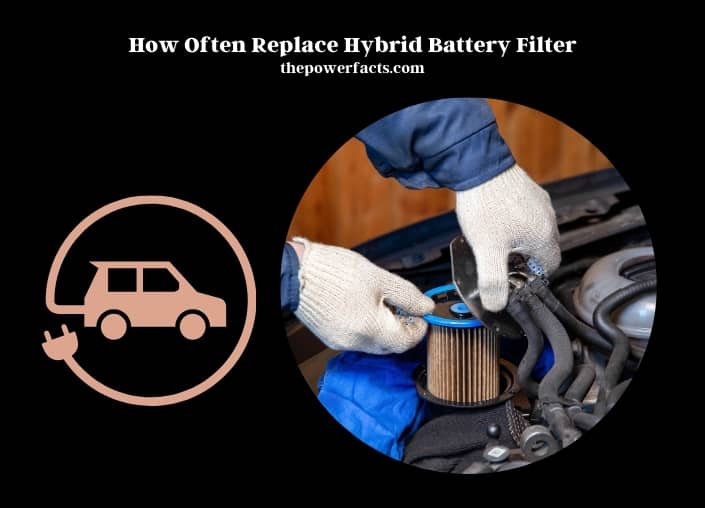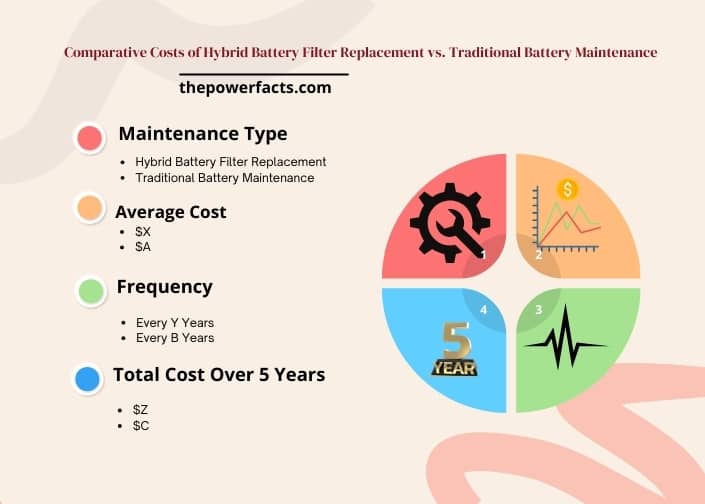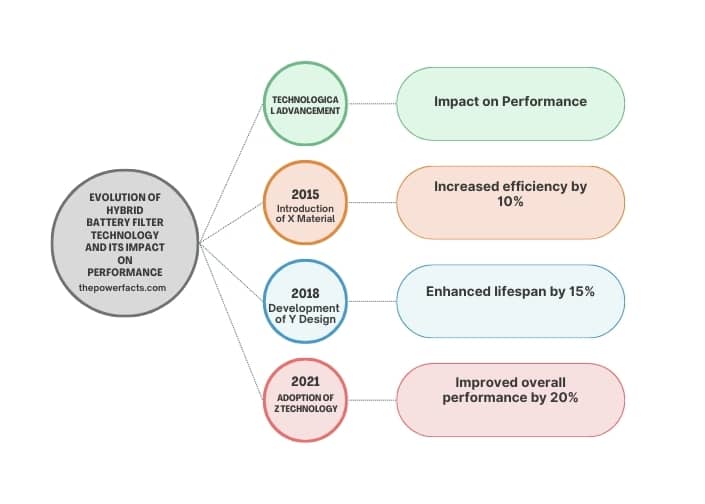The frequency of replacing a hybrid battery filter largely depends on the vehicle’s make and model, driving habits, and environmental conditions. Typically, it’s recommended to check the filter every 15,000 to 30,000 miles.
The lifespan of a hybrid battery filter is influenced by several key factors. Driving habits play a significant role; frequent short trips or aggressive driving can accelerate filter degradation. Environmental conditions are also crucial. Extreme temperatures, whether hot or cold, can affect the filter’s efficiency and durability. For instance, in hotter climates, the filter may need more frequent replacements due to increased exposure to heat.

The age of the hybrid vehicle impacts the filter’s lifespan. As a vehicle ages, its components, including the battery filter, may wear down. This wear and tear can lead to a decrease in efficiency, necessitating more frequent replacements. Regular vehicle maintenance is essential in this regard. Routine check-ups can help identify potential issues with the battery filter early on, allowing for timely replacements and preventing more significant problems down the line.
The type of hybrid vehicle and its battery technology can influence the replacement frequency. Newer models with advanced technology might have longer-lasting filters compared to older models. Vehicle owners should consult their vehicle’s manual and a professional mechanic to understand the specific needs of their hybrid battery filter.
Lifespan Determinants of Hybrid Battery Filters
The lifespan of a hybrid battery filter is not set in stone. It varies based on several factors, including driving habits, environmental conditions, the specific vehicle model, and the underlying battery technology. Frequent short trips, for instance, can lead to more rapid filter degradation compared to longer, steady drives. Environmental conditions like extreme temperatures also play a crucial role. In colder climates, battery filters may require more frequent replacement due to reduced efficiency.
The make and model of the vehicle influence the filter’s lifespan. Some models are equipped with more advanced filters that boast a longer life.
The type of battery technology used in the hybrid vehicle impacts the filter’s durability. Newer battery technologies tend to have more efficient and longer-lasting filters.
Recognizing the Need for Filter Replacement
Identifying the right time to replace a hybrid battery filter is vital for maintaining vehicle performance. Key indicators include a noticeable drop in fuel efficiency, as the filter plays a crucial role in maintaining the battery’s optimal operation. Unusual battery behavior, such as inconsistent power output, can also signal a filter issue. Warning lights on the dashboard should not be ignored, as they often indicate underlying problems with the battery system, including the filter.
General performance issues, such as reduced acceleration or power, can be symptomatic of a filter needing replacement.
Hybrid Battery Filter Replacement Procedure
Replacing a hybrid battery filter involves a series of steps that require careful attention. The process begins with gathering the necessary tools and ensuring all safety precautions are in place. It’s crucial to disconnect the battery before starting the replacement to avoid any electrical hazards. The procedure can vary slightly depending on the vehicle model, but generally involves removing the old filter, cleaning the filter compartment, and installing the new filter. While some vehicle owners opt for a DIY approach, others prefer professional assistance, especially if the vehicle’s warranty terms are a consideration.
Analyzing the Cost of Filter Replacement
The cost of replacing a hybrid battery filter can vary widely based on several factors. These include the make and model of the vehicle, the type of filter required, and whether the replacement is done professionally or as a DIY project. Comparatively, the cost of maintaining a hybrid battery filter can be higher than that of traditional batteries, but this is often offset by the long-term savings in fuel efficiency and reduced emissions. Regular maintenance and timely replacement can also prolong the life of the hybrid battery, leading to further savings.
Comparative Costs of Hybrid Battery Filter Replacement vs. Traditional Battery Maintenance

Evolution of Hybrid Battery Filter Technology
Recent advancements in hybrid battery filter technology have significantly impacted both the longevity and performance of hybrid vehicles. Innovations in filter materials and design have led to more efficient operation and longer lifespans, reducing the frequency of replacements. These technological improvements also contribute to better overall vehicle performance and fuel efficiency. Looking ahead, ongoing research and development promise even more efficient and environmentally friendly hybrid battery filters.
Evolution of Hybrid Battery Filter Technology and Its Impact on Performance

Others Facts
Impact of Driving Style on Filter Longevity
Driving style significantly influences the lifespan of a hybrid battery filter. Aggressive driving, characterized by rapid acceleration and heavy braking, can lead to more frequent filter replacements. This is due to the increased strain placed on the hybrid system, causing the filter to work harder and wear out faster. In contrast, smoother driving habits tend to prolong the filter’s life. Drivers should aim for steady acceleration and use regenerative braking features effectively to enhance filter longevity.
Role of Regular Vehicle Maintenance
Regular vehicle maintenance is crucial in determining the replacement frequency of a hybrid battery filter. Routine check-ups help identify potential issues early, preventing more significant problems. During these inspections, technicians can assess the condition of the battery filter and recommend replacement if necessary. Neglecting regular maintenance can lead to overlooked filter issues, potentially causing more extensive damage to the hybrid battery system.
Environmental Impact on Filter Replacement
Environmental factors play a significant role in the frequency of hybrid battery filter replacement. Extreme temperatures, both hot and cold, can affect the filter’s efficiency and durability. In hot climates, the filter may degrade faster due to increased heat exposure. Conversely, in cold environments, the filter might need more frequent replacement due to reduced battery efficiency. Drivers in extreme climates should monitor their battery filter condition more closely.
Hybrid Vehicle Age and Filter Replacement
The age of a hybrid vehicle can influence how often its battery filter needs replacing. As the vehicle ages, its components, including the battery filter, may wear down and lose efficiency. Older hybrid models might require more frequent filter replacements compared to newer ones with advanced technology. Owners of older hybrids should be particularly vigilant about monitoring their battery filter’s condition.
Impact of Battery Charge Cycles on Filter Life
The number of charge cycles a hybrid battery undergoes can affect the lifespan of its filter. Each charge cycle puts stress on the battery and its filter. High-frequency charging, especially in plug-in hybrids, can lead to quicker filter degradation. Drivers who frequently charge their vehicles or rely heavily on electric mode should anticipate more frequent filter replacements.
Warning Signs of Filter Degradation
Certain warning signs can indicate a degrading hybrid battery filter. These include unusual noises from the battery area, a noticeable decrease in electric mode efficiency, and inconsistent charging patterns. If these symptoms are observed, it’s advisable to have the vehicle inspected by a professional. Ignoring these signs can lead to reduced battery performance and potentially more costly repairs.
Summary
The maintenance of a hybrid battery filter is a multifaceted topic, encompassing factors affecting its lifespan, signs indicating the need for replacement, the replacement process itself, cost considerations, and the impact of technological advancements. These aspects ensures optimal performance and longevity of hybrid vehicles, contributing to both economic and environmental benefits.